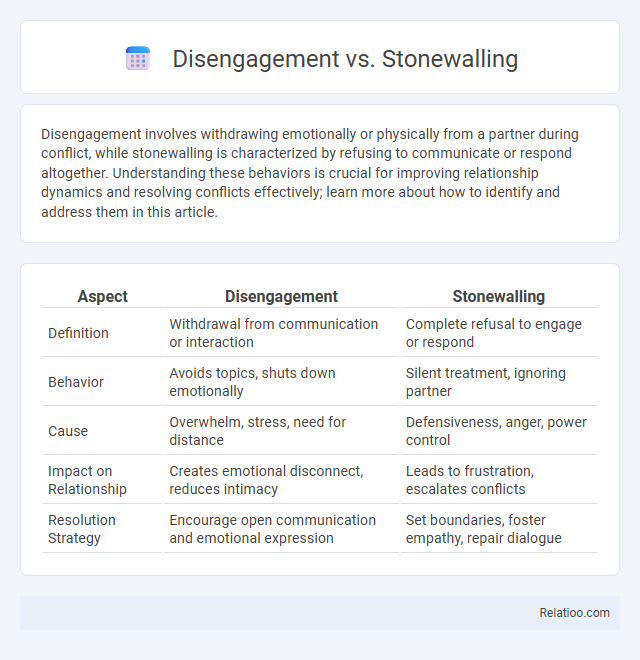Disengagement involves withdrawing emotionally or physically from a partner during conflict, while stonewalling is characterized by refusing to communicate or respond altogether. Understanding these behaviors is crucial for improving relationship dynamics and resolving conflicts effectively; learn more about how to identify and address them in this article.
Table of Comparison
| Aspect | Disengagement | Stonewalling |
|---|---|---|
| Definition | Withdrawal from communication or interaction | Complete refusal to engage or respond |
| Behavior | Avoids topics, shuts down emotionally | Silent treatment, ignoring partner |
| Cause | Overwhelm, stress, need for distance | Defensiveness, anger, power control |
| Impact on Relationship | Creates emotional disconnect, reduces intimacy | Leads to frustration, escalates conflicts |
| Resolution Strategy | Encourage open communication and emotional expression | Set boundaries, foster empathy, repair dialogue |
Understanding Disengagement and Stonewalling
Disengagement involves emotionally withdrawing from interaction to avoid conflict, while stonewalling is a more severe response characterized by complete silence and refusal to communicate, often signaling deep relational distress. Understanding disengagement requires recognizing it as a coping mechanism that temporarily reduces tension, whereas stonewalling represents an entrenched barrier to resolution and emotional connection. Identifying these behaviors is crucial for improving communication strategies in relationships and preventing escalation into chronic conflict.
Key Differences Between Disengagement and Stonewalling
Disengagement involves emotionally withdrawing or detaching from a situation, often to avoid conflict or protect oneself, while stonewalling is a form of active resistance characterized by shutting down communication entirely, refusing to respond or engage. You may recognize disengagement as subtle avoidance, whereas stonewalling appears as a deliberate, rigid barrier to dialogue. Understanding these key differences helps identify and address relationship dynamics effectively.
Emotional Impact on Relationships
Disengagement, stonewalling, and emotional withdrawal each have distinct emotional impacts on relationships, often leading to feelings of neglect, frustration, and emotional distance. Stonewalling, characterized by refusing to communicate or shutting down, intensifies conflict by creating a barrier to resolution, which can exacerbate feelings of loneliness and resentment in partners. Disengagement, marked by emotional or physical detachment, erodes intimacy and trust, ultimately weakening the emotional bond and increasing relationship dissatisfaction.
Signs of Disengagement in Communication
Signs of disengagement in communication include minimal verbal responses, lack of eye contact, and physical withdrawal, indicating a person is emotionally or mentally distancing themselves from the conversation. Stonewalling, a specific form of disengagement, often manifests as silent treatment, avoiding interaction, or shutting down emotionally to prevent conflict. Unlike general disengagement, which can be sporadic and unintentional, stonewalling is typically more deliberate and sustained, leading to breakdowns in effective communication and unresolved issues.
Identifying Stonewalling Behavior
Stonewalling behavior is characterized by emotionally withdrawing from conversations, often resulting in silent treatment or refusal to engage, which creates a barrier to effective communication. Unlike general disengagement, stonewalling specifically involves a deliberate shutdown of verbal and nonverbal interactions to avoid conflict or intimacy. Identifying stonewalling requires recognizing signs such as turning away, crossing arms, avoiding eye contact, and persistent silence during critical discussions in relationships.
Root Causes and Triggers
Disengagement often stems from emotional exhaustion or feeling overwhelmed, causing individuals to withdraw as a protective mechanism, while stonewalling is triggered by intense conflict or criticism, leading to a deliberate refusal to communicate or engage. Your awareness of these root causes helps differentiate between a temporary need for space and a deeper defense mechanism that halts meaningful dialogue. Recognizing these triggers allows for targeted strategies to address underlying fears and improve relational dynamics effectively.
Long-Term Effects on Mental Health
Disengagement, stonewalling, and emotional withdrawal each impact long-term mental health distinctly, with stonewalling often leading to increased feelings of isolation and exacerbated anxiety due to persistent emotional blockage. Disengagement can result in chronic stress and depression by fostering unresolved conflicts and persistent emotional distance, undermining relational stability. Consistent patterns of these behaviors may contribute to diminished self-esteem and heightened risk of mood disorders, emphasizing the importance of early intervention in relational communication dynamics.
Healthy Communication Alternatives
Disengagement, stonewalling, and avoidance are distinct communication breakdowns that hinder relationship growth and understanding. You can foster healthy communication by practicing active listening, expressing emotions openly without blame, and establishing regular check-ins to address concerns before they escalate. Prioritizing empathy and vulnerability encourages connection and prevents misunderstandings rooted in withdrawal or emotional shutdowns.
Breaking the Cycle of Disconnection
Breaking the cycle of disconnection involves recognizing the differences between disengagement, stonewalling, and withdrawal to foster healthier communication. Disengagement is characterized by emotional withdrawal during conflicts, while stonewalling refers to complete shutdown and refusal to engage, often exacerbating tension. Interrupting these patterns requires active listening, expressing vulnerability, and establishing mutual trust to rebuild connection and prevent relational breakdown.
Seeking Professional Help and Support
Seeking professional help is crucial when dealing with disengagement, stonewalling, and withdrawal in relationships, as therapists provide targeted strategies to improve communication and emotional connection. Couples counseling offers a supportive environment where individuals learn to recognize destructive patterns and develop healthier coping mechanisms. Early intervention by mental health professionals can prevent further relational deterioration and promote long-term intimacy and trust.

Infographic: Disengagement vs Stonewalling
 relatioo.com
relatioo.com